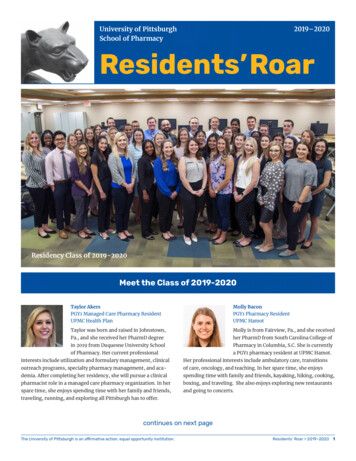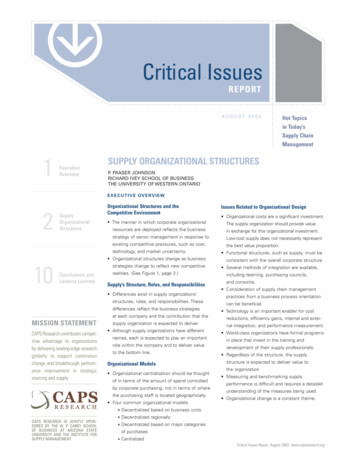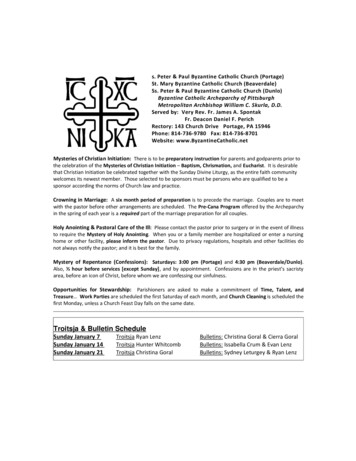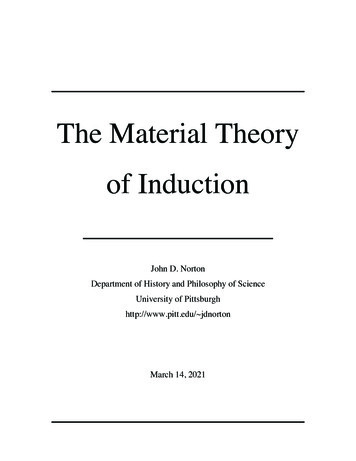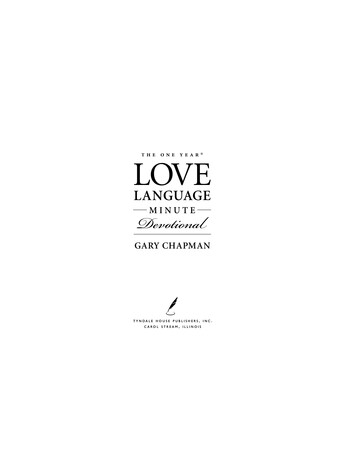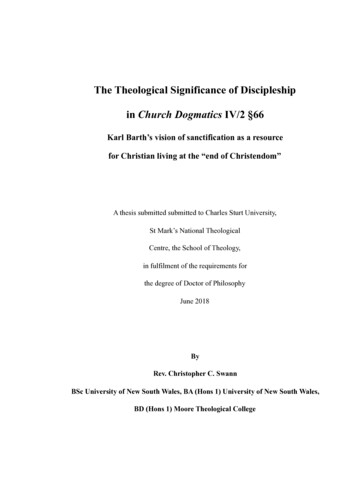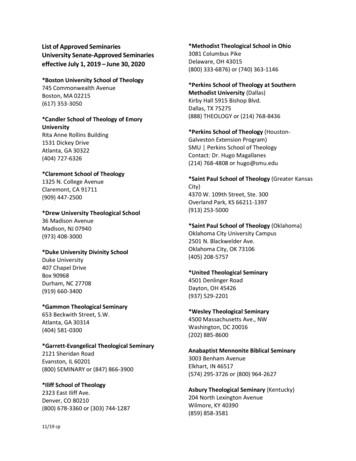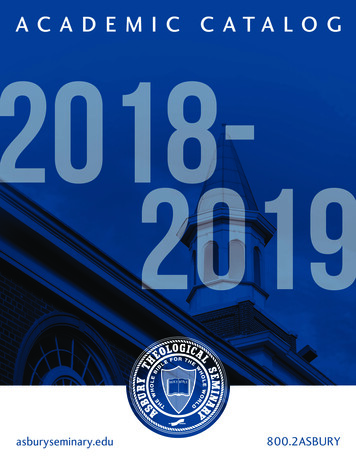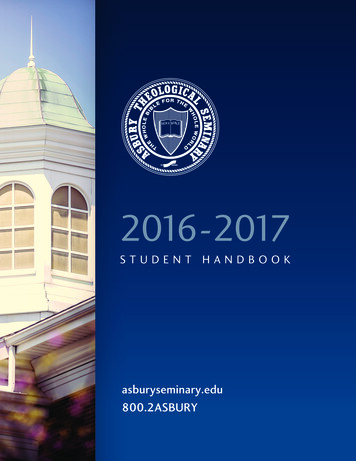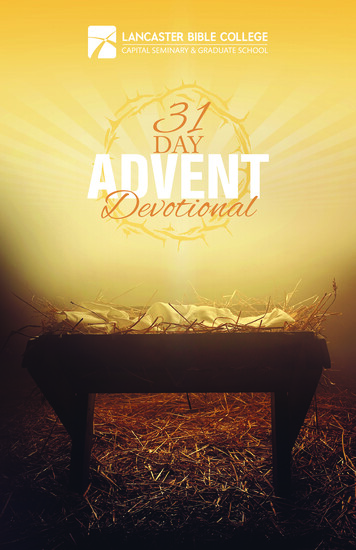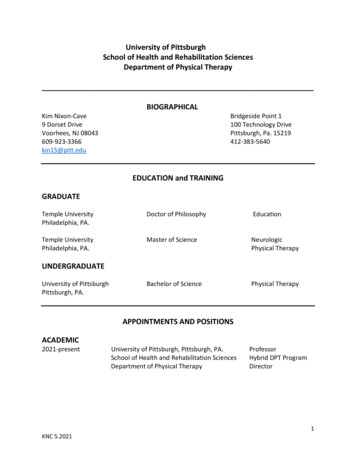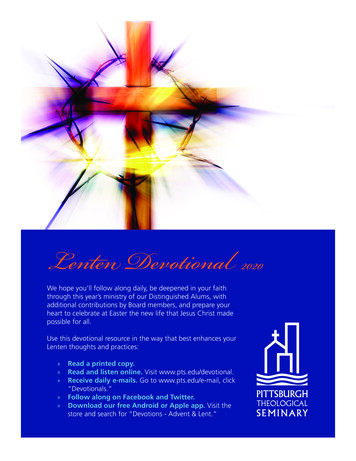
Transcription
Lenten Devotional 2020We hope you’ll follow along daily, be deepened in your faiththrough this year’s ministry of our Distinguished Alums, withadditional contributions by Board members, and prepare yourheart to celebrate at Easter the new life that Jesus Christ madepossible for all.Use this devotional resource in the way that best enhances yourLenten thoughts and practices:»»»»»Read a printed copy.Read and listen online. Visit www.pts.edu/devotional.Receive daily e-mails. Go to www.pts.edu/e-mail, click“Devotionals.”Follow along on Facebook and Twitter.Download our free Android or Apple app. Visit thestore and search for “Devotions - Advent & Lent.”
WEDNESDAY, FEBRUARY 26, 2020The Rev. Dr. Darrell W. Yeaney ’56, Specialized Ministry (2005)SCRIPTUREHebrews 12:1-141 Therefore, since we are surrounded by so great a cloudof witnesses, let us also lay aside every weight and the sinthat clings so closely, and let us run with perseverance therace that is set before us, 2 looking to Jesus the pioneer andperfecter of our faith, who for the sake of the joy that wasset before him endured the cross, disregarding its shame, andhas taken his seat at the right hand of the throne of God.3 Consider him who endured such hostility against himselffrom sinners, so that you may not grow weary or lose heart.4 In your struggle against sin you have not yet resisted tothe point of shedding your blood. 5 And you have forgottenthe exhortation that addresses you as children—“My child,do not regard lightly the discipline of the Lord, or lose heartwhen you are punished by him; 6 for the Lord disciplinesthose whom he loves, and chastises every child whom heaccepts.” 7 Endure trials for the sake of discipline. Godis treating you as children; for what child is there whoma parent does not discipline? 8 If you do not have thatdiscipline in which all children share, then you are illegitimateand not his children. 9 Moreover, we had human parentsto discipline us, and we respected them. Should we not beeven more willing to be subject to the Father of spirits andlive? 10 For they disciplined us for a short time as seemedbest to them, but he disciplines us for our good, in orderthat we may share his holiness. 11 Now, discipline alwaysseems painful rather than pleasant at the time, but later ityields the peaceful fruit of righteousness to those who havebeen trained by it. 12 Therefore lift your drooping hands andstrengthen your weak knees, 13 and make straight paths foryour feet, so that what is lame may not be put out of joint,but rather be healed. 14 Pursue peace with everyone, and theholiness without which no one will see the Lord.DEVOTIONALThe writer of the Book of Hebrews is unknown, but hisintention is clear. Writing to Jewish Christians in the firstcentury CE, he was keenly aware of the struggles facedby people of faith who lived in the pagan and polytheisticempire of Rome. That is why his writing is as explicit and clearas it is helpful to us today.Our world may be scientifically and technologically faradvanced over the writer’s known world—the pagan worldof the Roman Empire—but it is no less brimming with falsegods. We have grown up in a secular culture where our idolsare fame, power, wealth, and pleasure—all modern symbolsof success.2 Lent Devotional 2020Yet as Christians we know, and are reminded especiallyduring this period of Lent, of the lures that lead folks—including ourselves—into what the Scriptures call “sin,”a life forgetful of God’s presence and call to unselfish,compassionate living. The writer of Hebrews reminds usfollowers of Jesus that the remedy to keep us from thesemodern, powerful, social distractions of success is the sameas that in the first century: “keep your eyes on Jesus.”PRAYERDear Lord of the universe, of time, and of our lives, give usthe wisdom and courage to heed the insights of the writerof the Book of Hebrews as we face the attractions of today’sfalse gods. Give us the wisdom to be aware of the misleadinglures of our popular culture. And give us the courage to turnaway and set the eyes of our hearts on Jesus. Amen.THURSDAY, FEBRUARY 27, 2020The Rev. Dr. Stephen D. Crocco ’78, Academia (2005)SCRIPTUREHabakkuk 3:1-181 A prayer of the prophet Habakkuk according to Shigionoth.2 O LORD, I have heard of your renown,and I stand in awe, O LORD, of your work.In our own time revive it;in our own time make it known;in wrath may you remember mercy.3 God came from Teman,the Holy One from Mount Paran.His glory covered the heavens,and the earth was full of his praise.4 The brightness was like the sun;rays came forth from his hand,where his power lay hidden.5 Before him went pestilence,and plague followed close behind.6 He stopped and shook the earth;he looked and made the nations tremble.The eternal mountains were shattered;along his ancient pathwaysthe everlasting hills sank low.7 I saw the tents of Cushan under affliction;the tent-curtains of the land of Midian trembled.8 Was your wrath against the rivers, O LORD?Or your anger against the rivers,or your rage against the sea,when you drove your horses,your chariots to victory?9 You brandished your naked bow,sated were the arrows at your command.You split the earth with rivers.
10 The mountains saw you, and writhed;a torrent of water swept by;the deep gave forth its voice.The sun raised high its hands;11 the moon stood still in its exalted place,at the light of your arrows speeding by,at the gleam of your flashing spear.12 In fury you trod the earth,in anger you trampled nations.13 You came forth to save your people,to save your anointed.You crushed the head of the wicked house,laying it bare from foundation to roof.14 You pierced with their own arrows the head of hiswarriors,who came like a whirlwind to scatter us,gloating as if ready to devour the poor who were in hiding.15 You trampled the sea with your horses,churning the mighty waters.16 I hear, and I tremble within;my lips quiver at the sound.Rottenness enters into my bones,and my steps tremble beneath me.I wait quietly for the day of calamityto come upon the people who attack us.17 Though the fig tree does not blossom,and no fruit is on the vines;though the produce of the olive failsand the fields yield no food;though the flock is cut off from the foldand there is no herd in the stalls,18 yet I will rejoice in the LORD;I will exult in the God of my salvation.DEVOTIONALHabakkuk knew that God’s judgment was real. Historyproved it. If the Exodus was not a story of judgment againstthe Egyptians in history, what was it? Yet Habakkuk struggledmightily when it was inevitable that God was going to usethe nation of Babylon to bring judgment against God’s ownpeople.PRAYERAlmighty God, soften my heart and let me see the extent towhich I have sinned against your holiness and the creaturesyou love. Though I can only see pain ahead for now, Iaccept your judgment and pray that, in your wrath, you willremember mercy. Amen.FRIDAY, FEBRUARY 28, 2020The Rev. Sue Sterling Montgomery ’77, Pastoral Ministry(1998)SCRIPTUREJohn 17:9-199 I am asking on their behalf; I am not asking on behalfof the world, but on behalf of those whom you gave me,because they are yours. 10 All mine are yours, and yours aremine; and I have been glorified in them. 11 And now I amno longer in the world, but they are in the world, and I amcoming to you. Holy Father, protect them in your name thatyou have given me, so that they may be one, as we are one.12 While I was with them, I protected them in your namethat you have given me. I guarded them, and not one ofthem was lost except the one destined to be lost, so that thescripture might be fulfilled. 13 But now I am coming to you,and I speak these things in the world so that they may havemy joy made complete in themselves. 14 I have given themyour word, and the world has hated them because they donot belong to the world, just as I do not belong to the world.15 I am not asking you to take them out of the world, butI ask you to protect them from the evil one. 16 They do notbelong to the world, just as I do not belong to the world.17 Sanctify them in the truth; your word is truth. 18 As youhave sent me into the world, so I have sent them into theworld. 19 And for their sakes I sanctify myself, so that theyalso may be sanctified in truth.DEVOTIONALWhen all was said and done, the cold, hard, reality ofjudgment did not prompt protests from Habakkuk; instead heprayed, “in your wrath may you remember mercy.” What aforeign-sounding prayer today! It’s not that we don’t believein mercy, it’s that we don’t believe in wrath!John’s Gospel passage could be called a conundrum of wordsgoing ’round and around. They sound a lot like the 1930ssong “The Music Goes Round and Round,” recorded byTommy Dorsey:In this season of Lent, when our sins are ever before us, darewe not take God’s wrath seriously? How can we deny thetimes when God’s judgment is inevitable in our lives as weface the consequences of our acts of betrayal, abuse, theft,failure, sloth, and faithlessness? What do we do when God’swrath washes over us like the Red Sea washed over Pharaoh’schariots? In these moments, may we join Habakkuk inpraying, “in your wrath may you remember mercy.”I blow through here,The music goes ’round and around—Whoa-ho-ho-ho-ho-ho—And it comes out here.I push the first valve down,The Music goes down and around—Whoa-ho-ho-ho-ho-ho—And it comes out here.I push the other valve down,Pittsburgh Theological Seminary www.pts.edu
The music goes ’round and around—Whoa-ho-ho-ho-ho-ho—And it comes out here.SATURDAY, FEBRUARY 29, 2020Jesus’ prayer seems a lot like air going ’round and aroundin a trumpet and coming out as sounds—sounds that areconfusing: no longer in the world/in the world, hated by theworld/do not belong to the world, not out of the world/nolonger in the world, into the world—what?SCRIPTURETo understand Jesus’ prayer we have to go back in time andunderstand how two opposite views of life guided ancientthinking. Greek philosophy saw the world as divided into tworealms: the earthly and the spiritual. This view led to a majorunderstanding of Christianity that still haunts us today—thebelief that Christianity is about life not in this world butin the next world. Jesus brings these dual and conflictingimages into his prayer. He knows the people listening to himare struggling to understand, just as we are, these dualitiesas well as the more troubling concepts of heaven and hell.This way of thinking has a long history that isn’t going to goaway.But Jesus gives us another way to view our complicated andspinning world. He was nurtured in the Judaic understandingsof life and creation: the world—heaven and earth—is oneholy place created by God. God is in the world, and holinessin life is lived in the world. Nowhere do we see this viewmore clearly than in the words of the Lord’s Prayer for God’skingdom to come “on earth as it is in heaven.”As the music goes ’round and around in our lives, where is itcoming out—in love, or in Law? In grace and forgiveness, orin fear and judgment? Is the song we are singing in the worldand affirming of life? Or is it a song of separation? May themusic of our hearts go ’round and around—and come outwith Jesus’ glorious and jubilant words of grace, faith, andpromise.PRAYERMost gracious and loving God, on the night of Jesus’ birth hiscry burst into song, which changed history. As he grew, histeachings became life-changing songs of love. When he wastried, crucified, and died, the world thought his song wassilenced. His resurrection brought forth a glorious song ofunending love. Help us never to forget that, if Christ’s song isto continue, we must do the singing. May we sing a jubilantsong of faith, hope, love, and justice “on earth as it is inheaven.” In Christ we pray, amen.The Rev. Lisa Dormire ’86, Specialized Ministry (2006)Ezekiel 39:21-2921 I will display my glory among the nations; and all thenations shall see my judgment that I have executed, andmy hand that I have laid on them. 22 The house of Israelshall know that I am the LORD their God, from that dayforward. 23 And the nations shall know that the houseof Israel went into captivity for their iniquity, because theydealt treacherously with me. So I hid my face from themand gave them into the hand of their adversaries, and theyall fell by the sword. 24 I dealt with them according to theiruncleanness and their transgressions, and hid my face fromthem. 25 Therefore thus says the Lord GOD: Now I willrestore the fortunes of Jacob, and have mercy on the wholehouse of Israel; and I will be jealous for my holy name.26 They shall forget their shame, and all the treachery theyhave practiced against me, when they live securely in theirland with no one to make them afraid, 27 when I havebrought them back from the peoples and gathered themfrom their enemies’ lands, and through them have displayedmy holiness in the sight of many nations. 28 Then they shallknow that I am the LORD their God because I sent them intoexile among the nations, and then gathered them into theirown land. I will leave none of them behind; 29 and I willnever again hide my face from them, when I pour out myspirit upon the house of Israel, says the Lord GOD.DEVOTIONALThere is an old Chinese proverb that says, “May you live ininteresting times.” Certainly we are living in interesting times.There are other words that we might also use . . . difficult,sad, confusing, overwhelming. The people of Israel in thispassage from Ezekiel were also living in “interesting times.”Sin. Exile. God’s face hidden from them. Perhaps like we do,they found it hard to get out of bed in the morning. Perhapslike we do, they wondered how to live faithfully in their“interesting times.”Nevertheless, a word came to them from God in the midst ofsuch times: “I will have compassion. I will forgive. I will gatherthem back. I will show them my face once again. I will pourout my Spirit upon them.”Anne Lamott blogs, “. . . the world has always been this way,people have always been this way, grace always bats last, itjust does—and finally, when all is said and done, and the dustsettles, which it does, Love is sovereign here” (Facebook post,July 15, 2016). Alleluia.4 Lent Devotional 2020
PRAYERHoly God, on this Lenten journey we feel at times as thoughyour face is hidden from us. Speak love to us. Gather us back.Show us your face. Remind us that your love carries us, nomatter how “interesting” the times in which we are living.Amen.the tree of life, and eat, and live forever”—23 therefore theLORD God sent him forth from the garden of Eden, to tillthe ground from which he was taken. 24 He drove out theman; and at the east of the garden of Eden he placed thecherubim, and a sword flaming and turning to guard the wayto the tree of life.DEVOTIONALSUNDAY, MARCH 1, 2020The Rev. Dr. Donald P. Owens ’69, Academia (2002)SCRIPTUREGenesis 2:15-17; 3:1-13, 20-24 (Sunday Readings)15 The LORD God took the man and put him in thegarden of Eden to till it and keep it. 16 And the LORD Godcommanded the man, “You may freely eat of every tree ofthe garden; 17 but of the tree of the knowledge of goodand evil you shall not eat, for in the day that you eat of it youshall die.” . . . 3:1 Now the serpent was more crafty than anyother wild animal that the LORD God had made. He said tothe woman, “Did God say, ‘You shall not eat from any treein the garden’?” 2 The woman said to the serpent, “We mayeat of the fruit of the trees in the garden; 3 but God said,‘You shall not eat of the fruit of the tree that is in the middleof the garden, nor shall you touch it, or you shall die.’” 4 Butthe serpent said to the woman, “You will not die; 5 for Godknows that when you eat of it your eyes will be opened, andyou will be like God, knowing good and evil.” 6 So whenthe woman saw that the tree was good for food, and that itwas a delight to the eyes, and that the tree was to be desiredto make one wise, she took of its fruit and ate; and she alsogave some to her husband, who was with her, and he ate.7 Then the eyes of both were opened, and they knew thatthey were naked; and they sewed fig leaves together andmade loincloths for themselves. 8 They heard the soundof the LORD God walking in the garden at the time of theevening breeze, and the man and his wife hid themselvesfrom the presence of the LORD God among the trees of thegarden. 9 But the LORD God called to the man, and said tohim, “Where are you?” 10 He said, “I heard the sound ofyou in the garden, and I was afraid, because I was naked;and I hid myself.” 11 He said, “Who told you that you werenaked? Have you eaten from the tree of which I commandedyou not to eat?” 12 The man said, “The woman whom yougave to be with me, she gave me fruit from the tree, and Iate.” 13 Then the LORD God said to the woman, “What isthis that you have done?” The woman said, “The serpenttricked me, and I ate.” . . . 20 The man named his wife Eve,because she was the mother of all living. 21 And the LORDGod made garments of skins for the man and for his wife,and clothed them. 22 Then the LORD God said, “See, theman has become like one of us, knowing good and evil;and now, he might reach out his hand and take also fromThis great story of the primordial parents of the whole humanrace continues to invoke the nature of humanity and thegrace of the loving God and Creator. This story is one offreedom and love. We have been created free to make ourchoices—but not free to choose our consequences! Lent isthe time to examine our choices and their consequences.Human beings continually make poor choices and pursueinadequate remedies for their mistakes. Adam and Eve ateof the forbidden fruit and realized they were naked. Toremedy their vulnerability, they made clothes of fig leaves. Buthumans are allergic to fig leaves, not to mention the leavesare not large enough to cover what needs to be covered andwilt shortly after being taken from the tree. Adam and Evewere afraid. They suffered deep and profound fear.But God, being more concerned with their (and our) futurethan with their past, steps into the picture and remarks, Youate from the forbidden tree! His grace prevails, and he makesfor them clothes out of skins—adequate and lasting. WithEve following him, Adam is removed from the Garden, andthus they are protected. For if they had eaten from the Treeof Life (the other tree growing in the center of the Garden),they would have lived forever in their state of fear. God’sgracious act of removal prevents their living eternally in painand shame.In this time of Lent, let us examine our lives. We know thatwe often make many poor choices and just as poorly try tocorrect or cover them up. At the same time, we often reapthe consequences. Instead of dwelling on our poor choices,let us recognize God’s embracing grace. What may seem likea curse is often, instead, divine grace that keeps us from aneven worse fate. For God is infinitely more concerned withour future than our past. Lent is the time to embrace God’sgrace and love in our lives—and in the lives of all around us.PRAYERAlmighty God, whose blessed Son was led by the Spiritto be tempted by Satan, come quickly to help us, for weare assaulted by many temptations. You know all ourweaknesses—let each one of us find you mighty to save. Wemake these requests through Jesus Christ, your Son, our Lord,who lives and reigns with you and the Holy Spirit, one God,now and forever. Amen.Pittsburgh Theological Seminary www.pts.edu
MONDAY, MARCH 2, 2020The Rev. Paul D. Wierman ’61, Pastoral Ministry (2013)Written before he died July 15, 2019SCRIPTUREPsalm 61 O LORD, do not rebuke me in your anger,or discipline me in your wrath.2 Be gracious to me, O LORD, for I am languishing;O LORD, heal me, for my bones are shaking with terror.3 My soul also is struck with terror,while you, O LORD—how long?4 Turn, O LORD, save my life;deliver me for the sake of your steadfast love.5 For in death there is no remembrance of you;in Sheol who can give you praise?6 I am weary with my moaning;every night I flood my bed with tears;I drench my couch with my weeping.7 My eyes waste away because of grief;they grow weak because of all my foes.8 Depart from me, all you workers of evil,for the LORD has heard the sound of my weeping.9 The LORD has heard my supplication;the LORD accepts my prayer.10 All my enemies shall be ashamed and struck with terror;they shall turn back, and in a moment be put to shame.DEVOTIONALLent is serious business. And the themes of today’s readingfrom Psalm 6, a lamentation of David, reflect the seriousbusiness of pain and suffering, fear and death. So it surprisesme that the sixth Psalm was meant to be sung.Old Testament scholars do not know the melodies indicatedin the superscriptions of many of the Psalms, but considerthe example of Psalm 23. I am convinced that it was set incommon meter, paraphrased by the author, and set to a tune,as it was in the Scottish Psalter of 1650 and has become sofamiliar in the tuneful song lyrics “The Lord’s my shepherd, I’llnot want . . . .”But paraphrasing Psalm 6 isn’t easy. One must congratulatethose ancients who took its mournful phrases and madethem resonate and harmonize. Psalm 6 is a complaint, asad song sung by a choir of quite devoted holy people. InAmerican colonial years, paraphrases were the cause ofschism. Presbyterians fled from congregations who sang IsaacWatts’s paraphrased psalms and repeatedly rejected suchhymns as Joy to the World (based on Psalm 98), Jesus ShallReign Where’er the Sun (based on Psalm 72), and O God,Our Help in Ages Past (based on Psalm 90). They argued thatthese musical expressions were not the true “word of God”6 Lent Devotional 2020and thus that hymns based on ideas found in the Bible wereunacceptable. Contemporary worshipers, on the other hand,love Watts’s familiar hymns.It strikes me as ironic how closely Psalm 6 parallels the sixthchapter of Job. Job, too, voices numerous arguments withGod—arguments I might paraphrase thus:The Almighty is at war with me.His arrows [poisoned arrows!] pierce me.The Lord’s word is against me.I await your instruction.Speak and I will be silent.Please recall that my life is a breath.God, I will not blaspheme to your face.Rescue me!If you have ever been in a circumstance from which yousought deliverance, you can resonate with these words—theagony as well as the faithful pleading offered by Job andexpressed by David in Psalm 6.PRAYERAlmighty God, we are in need of your deliverance. We needyou to come to our rescue at the perfect moment—to inviteus into the warmth and safety of your shelter from the stormsof our lives. Thank you that you are behind all compassionateacts of deliverance—the true focus of the season of Lent.Amen.TUESDAY, MARCH 3, 2020Steven A. Falci ’03, Specialized Ministry (2016)SCRIPTURE1 Corinthians 1:20-3120 Where is the one who is wise? Where is the scribe? Whereis the debater of this age? Has not God made foolish thewisdom of the world? 21 For since, in the wisdom of God,the world did not know God through wisdom, God decided,through the foolishness of our proclamation, to save thosewho believe. 22 For Jews demand signs and Greeks desirewisdom, 23 but we proclaim Christ crucified, a stumblingblock to Jews and foolishness to Gentiles, 24 but to thosewho are the called, both Jews and Greeks, Christ the powerof God and the wisdom of God. 25 For God’s foolishness iswiser than human wisdom, and God’s weakness is strongerthan human strength. 26 Consider your own call, brothersand sisters: not many of you were wise by human standards,not many were powerful, not many were of noble birth.27 But God chose what is foolish in the world to shame thewise; God chose what is weak in the world to shame thestrong; 28 God chose what is low and despised in the world,things that are not, to reduce to nothing things that are,
29 so that no one might boast in the presence of God. 30 Heis the source of your life in Christ Jesus, who became for uswisdom from God, and righteousness and sanctification andredemption, 31 in order that, as it is written, “Let the onewho boasts, boast in the Lord.”DEVOTIONAL“Consider your own call.” St. Paul’s words to the Corinthiansprovide us the opportunity to reflect on our own call here andnow. Most often we associate calls with the call to ordainedministry; but each and every one of us has a call, and thatcall is from God and rooted in Christ Jesus. “He is the sourceof your life in Christ Jesus, who became for us wisdom fromGod.”As we move through Lent this year, let us slow down andtake the time to consider what God may be calling us to. Itmay involve a career change, or it may be ways to be morepresent to minister to those around us in need. Let us humblyreflect on the gifts we have been given by God and discernhow God may be calling us to use these gifts for God’sgreater glory. Finally, let us give thanks to God for the giftshe has endowed us with—and pray for the strength andconsolation to be grounded in these gifts and guided by Godin following our call.PRAYERTake, Lord, and receive all my liberty,my memory, my understanding,and my entire will,All I have and call my own.You have given all to me.To you, Lord, I return it.Everything is yours; do with it what you will.Give me only your love and your grace,that is enough for me.(Suscipe – St. Ignatius of Loyola)WEDNESDAY, MARCH 4, 2020The Rev. Dr. James E. Davison ’69, Academia (2009)SCRIPTURE1 Corinthians 2:1-131 When I came to you, brothers and sisters, I did not comeproclaiming the mystery of God to you in lofty words orwisdom. 2 For I decided to know nothing among youexcept Jesus Christ, and him crucified. 3 And I came toyou in weakness and in fear and in much trembling. 4 Myspeech and my proclamation were not with plausible wordsof wisdom, but with a demonstration of the Spirit and ofpower, 5 so that your faith might rest not on human wisdombut on the power of God. 6 Yet among the mature we dospeak wisdom, though it is not a wisdom of this age or ofthe rulers of this age, who are doomed to perish. 7 But wespeak God’s wisdom, secret and hidden, which God decreedbefore the ages for our glory. 8 None of the rulers of thisage understood this; for if they had, they would not havecrucified the Lord of glory. 9 But, as it is written, “What noeye has seen, nor ear heard, nor the human heart conceived,what God has prepared for those who love him”—10 thesethings God has revealed to us through the Spirit; for theSpirit searches everything, even the depths of God. 11 Forwhat human being knows what is truly human except thehuman spirit that is within? So also no one comprehendswhat is truly God’s except the Spirit of God. 12 Now we havereceived not the spirit of the world, but the Spirit that is fromGod, so that we may understand the gifts bestowed on us byGod. 13 And we speak of these things in words not taughtby human wisdom but taught by the Spirit, interpretingspiritual things to those who are spiritual.DEVOTIONALAcross the Allegheny River from Highland Park, the RomanCatholic parish in Aspinwall, St. Scholastica, contains anintriguing crucifix on the back wall of the chancel. Behind alarger-than-life wood carving of the crucified Jesus, the artisthas painted bright beams of light in red, yellow, and white,radiating outward in all directions. What a combination—thecrucifixion joined together with the glory of the Lord!Now I don’t usually link the crucifixion with glory. I thinkof God as glorious, God’s creative works as glorious, andcertainly the resurrection as glorious. But the cross? Not somuch. But then, this image in the chancel reminded me ofverse 8 of today’s passage from 1 Corinthians 2, with theApostle Paul’s comment about “the rulers of this age” who“crucified the Lord of glory.”How could those rulers have missed Jesus’ identity? It’sbecause, says Paul, they were looking for glory in humancharacteristics such as power, wisdom, impressive speech,and noble birth. In short, those rulers expected to find gloryin the kind of qualities that all human societies--including ourown!—have normally prized and praised.Paul recognized that the early Corinthian church was alsocaptivated by such thinking, hence his reminder in verse 2that he had tried to counter their expectations by “knowingnothing among you except Jesus Christ, and him crucified.”Obviously, this striking phrase describes perfectly the need forthose Corinthians, and for all later followers of Jesus (again,including us, of course) to focus on humility, not glory. Butthe mysterious truth here, which, in verse 7, Paul calls “God’ssecret and hidden wisdom,” is precisely this: we are imitatingour glorious Lord as we live humbly and give of ourselves forthe benefit of others.Pittsburgh Theological Seminary www.pts.edu
As we reflect on God’s hidden wisdom this Lenten season,perhaps we can recall St. Scholastica’s chancel, with the linkit makes between the cross and the Lord of glory. For me,that means trying to serve with a greater awareness thatsuch service isn’t only about showing compassion or meetingsomeone’s need. Whether helping a friend, assisting in amission or ministry, or undertaking some very minor service,at a deeper, hidden level there’s also a glorious aspect to it,for it means that I’m walking in the way the Lord of glory didwhen he offered himself so selflessly for others.PRAYERGlorious God, I thank you that in Jesus Christ you haverevealed your hidden wisdom and displayed your powerthrough what our world calls weakness and foolishness.Grant that I, too, may display wisdom in serving and giving ofmyself, instead of striving after success or seeking for thingssuch as worldly approval or acclaim. In Christ, the Lord ofglory, I pray. Amen.THURSDAY, MARCH 5, 2020The Rev. Dr. Tami Hooker ’02, Specialized Ministry (2017)SCRIPTUREGenesis 39:1-231 Now Joseph was taken down to Egypt, and Potiphar, anofficer of Pharaoh, the captain of the guard, an Egyptian,bought him from the Ishmaelites w
2 Lent Devotional 2020 WEDNESDAY, FEBRUARY 26, 2020 The Rev. Dr. Darrell W. Yeaney ’56, Specialized Ministry (2005) SCRIPTURE Hebrews 12:1-14 1 Therefore, since we are surrounded by so great a cloud of witnesses, let us also lay aside every weight and the sin tha

